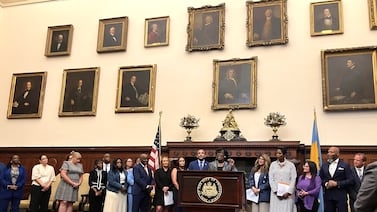Sign up for Chalkbeat Philadelphia’s free newsletter to keep up with news on the city’s public school system.
Pennsylvania Gov. Josh Shapiro’s proposed budget would provide over $200 million more to Philadelphia schools.
In his spending blueprint for 2025-26, Shapiro is also requesting millions more for school repairs, free school breakfast, special education, student-teacher stipends, and student mental health.
The bulk of the increase for Philadelphia comes from Shapiro’s proposal to send an additional $494 million to the state’s highest needs school districts — based on their tax base and per-student costs — in the wake of a 2023 ruling that declared the previous state school funding formula unconstitutional. Of that amount, Philadelphia would receive $137 million.
Shapiro is also proposing changes to how cyber charter schools are funded by re-introducing an $8,000 standard tuition rate for all cyber students, which would save the district another $50 million if enacted. Shapiro proposed the same flat rate in his budget plan last year, but the final budget did not include it.
In addition, Shapiro is proposing a $75 million increase to be distributed to all school districts through the Basic Education Funding formula, the biggest single source of state school aid. City schools would get a $12.5 million increase through that funding stream, bringing their total to $1.6 billion out of $8.2 billion for schools statewide.
The final portion of the roughly $200 million increase for Philly schools would come from an additional $5.6 million for special education.
Even with those increases, Philadelphia would still need an additional $975 million to meet all the educational needs of its nearly 200,000 students in district and charter schools, according to a state analysis.
Shapiro included no money for private school vouchers in his budget. The governor backed the creation of vouchers in 2023, but ultimately signed a budget last year that didn’t include them.
“What we’re doing for education is working now – let’s continue to build on this foundation we’ve laid,” Shapiro said in a Tuesday speech in Harrisburg about his spending plan.
Shapiro’s remarks came shortly after several executive orders from President Donald Trump that expressed very different priorities for funding and other education issues. In his second term, Trump has issued directives to withhold funding for schools that teach “discriminatory equity ideology” and affirm the rights of transgender students. He also issued orders to send more federal funding to private school voucher programs and cleared the way for immigration arrests at schools, among other things.
“This nation saw significant political change in the last election,” said Shapiro, who was once rumored to be a frontrunner for vice president on the 2024 Democratic ticket. “Despite all that change in D.C., the voters here in Pennsylvania returned a Republican-controlled state Senate and a Democratic-controlled state House — with the exact same margins — to continue working with me to get stuff done.”
In his budget, districts would get $40 million more for special education and $5.5 million more for career and technical education. The state’s strained student-teacher stipend program would see a boost of $20 million, while the Pre-K Counts program would get a $17 million increase.
There would also be $23.5 million more for student transportation, $14.5 million additional for early intervention programs, and $10.8 million more for school food services, among other additions for education.
Shapiro’s budget proposal will now go through the legislative process over the next few months.
Shapiro doesn’t push for vouchers
Philadelphia Superintendent Tony Watlington told Chalkbeat last week he is focused on proving to conservative lawmakers that the district is a good steward of state funding.
Despite challenges for the district related to aging infrastructure, budgets, and long-term academic goals, he’s also touting more positive signs: Student attendance is up, as is the four-year graduation rate, Watlington said. The dropout rate is down by more than a thousand students and fourth grade math scores are improving. More funding will allow that progress to continue, he said.
“This proposed investment from the state would allow the District to continue accelerating academic achievement as the District works to become the fastest improving, large urban school district in the nation,” Watlington said in a statement Tuesday in response to Shapiro’s budget.
The negotiations over education spending must abide by a ruling from Commonwealth Court Judge Renée Cohn Jubelirer, who found in February 2023 that the way the state funded schools was unconstitutional because aid was both inadequate and inequitably distributed. The system shortchanged students with greater needs, Jubelirer said.
“Last year, we made a commitment to not only invest a record amount of money in public education but create a brand-new formula that drives that money out to the schools that need it most,” Shapiro said. “You voted for that, I signed it into law, and we agreed to keep doing it until we meet our obligation.”
But public education advocates and policy analysts say even with Shapiro’s increases, the state should be doing more to fund struggling districts.
Donna Cooper, executive director of advocacy group Children First, praised Shapiro’s budget — but said the increases need to ramp up faster. Cooper said the $494 million dedicated to sending more money to the poorest districts is “history-making ... important and a needed departure from past policy.”
At the same time, she said, it is not enough if the remaining $3.5 billion state funding “adequacy gap” must be closed in three years, per a legislative Basic Education Funding Commission commitment after the judge’s 2023 decision. This amount won’t do it, she said. What Shapiro is proposing “will close the gap in seven years. We really believe that needs to be faster,” Cooper said.
Advocates at the Education Law Center PA and Public Interest Law Center, who represented the plaintiffs in the lawsuit that led to the 2023 ruling from Jubelirer, said in a statement that “the current timeline for reaching adequacy remains too slow and means that today’s kindergartners will be nearing high school before schools have the funds the state admits they need to succeed.”
In addition to leaving out his proposal from last year to establish vouchers, which he called Pennsylvania Award for Student Success Scholarship and are also sometimes known as Lifeline Scholarships, Shapiro’s budget book does not show any increase for the state’s tax-credit scholarship programs that support private school tuition. Those programs would be flat-funded at the same rate as last year, according to Shapiro’s plan.
All of that displeased school choice advocates, like the conservative Commonwealth Foundation, which has pressured Shapiro to adopt a state-funded private school voucher program.
The budget proposal “notably lacked funding for [Shapiro’s] distant bipartisan campaign promises like educational choice—neither through Lifeline Scholarships nor tax credits,” said Andrew Lewis, president and CEO of the foundation, in a statement.
Correction: An earlier version of this story included an incorrect figure for the remaining adequacy gap for Philadelphia schools.
Dale Mezzacappa is a senior writer for Chalkbeat Philadelphia, where she covers K-12 schools and early childhood education in Philadelphia. Contact Dale at dmezzacappa@chalkbeat.org.
Carly Sitrin is the bureau chief for Chalkbeat Philadelphia. Contact Carly at csitrin@chalkbeat.org.






